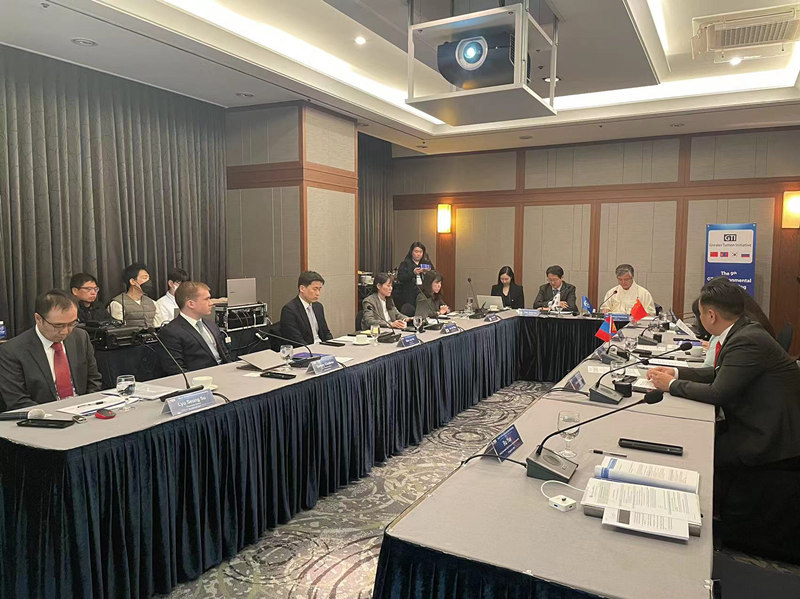
The 9th GTI Environmental Board Meeting was held on 22 November 2023 in Seoul, Korea. The event was hosted by the Ministry of Environment, Republic of Korea and organized by the GTI Secretariat.
The Meeting first reviewed the progress of GTI's Regional Environmental Cooperation since the 8th environmental meeting. Then, the participants had an open exchange of national progress and strategies for NEA regional environmental cooperation focusing on dust and sandstorm, wildlife, and education network. Members further discussed the ways forward for NEA regional environmental cooperation, especially on the suggestions to identify the prioritized area for further developing the strategic framework-related document.
Last but not least, members approved the GTI Environment Work Plan for 2023-2024. China assumed the next Chairmanship of the GTI Environmental Board, and committed to closely communicate with the GTI Secretariat during the chairmanship.
Annex: Presentations from members on environmental protection progress and ways forward for NEA regional environmental cooperation focusing on DSS, wildlife, and education network.
(China) Dr. Wang Yujuan (Professor, Foreign Environmental Cooperation Center, Ministry of Ecology and Environment) first briefly introduced the progress of China's ecological conservation. Advancements in air and soil quality were demonstrated through data, reflecting the effectiveness of recent environmental regulations. The results in air quality indicate that the average concentration of fine particulate matter (PM2.5) in cities above the prefecture level reached 29 micrograms per cubic meter in 2022, reflecting a 3.3% decrease compared to 2021. And the percentage of days with good air quality reached 86.5%, marking a 0.9% improvement from the annual target. Additionally, the proportion of surface water at or above grade three increased to 87.9%, the soil Environmental Quality has undergone fundamental changes compared to a decade ago. Regarding climate change, the Chinese government's promotion of carbon-neutral structural adjustments in energy and transportation was emphasized, with a special focus on new energy vehicles. Regarding natural ecological environment protection, she emphasized over 20 laws and regulations have been enacted to enhance geological and environmental protection systems, including the establishment of a conservation red line system and a natural reserve system centered around national parks. She highlighted China's achievements in environmental conservation, emphasizing its commitment to global frameworks. She outlined efforts in wildlife conservation, environmental education, and regional cooperation in Northeast Asia. The successful history of China-Japan-Korea cooperation in the habitat protection and ecological restoration of crested ibis was also noted. Finally, she expressed a willingness to continue environmental information exchange and cooperation.
(Mongolia) Mrs. Bayarmaa Batsukh (Director General, Public Administration and Management Department, Ministry of Environment and Tourism) indicated that dust and sandstorms, as well as drought challenges, are high-attention topics among international communities, such as at recently organized CRIC 21. On DSS, Mongolia has been actively engaging with member states on capacity building, scientific research, monitoring fields and technical assistance. Climate change and soil erosion are considered the key factors in the sand and dust storm occasions in Mongolia. Notably, after the high volume of DSS happened in Mongolia and the People's Republic of China, to strengthen the bilateral cooperation, with the support of the Chinese government, a desertification cooperation center will be established in Mongolia between 2025 and 2026. Also, Mongolia would like to suggest GTI Secretariat working closely with the DLDD-NEAN network to further cooperate on desertification and land degradation. On wildlife, Mongolia has been improving its conservation measures and public awareness activities towards sustainable nature resource management. Particularly, Mongolia is interested developing cooperation in GTI on wildlife-friendly infrastructure, as well as on wildlife disease control, to find a way for livestock herding to harmony with wildlife. For environmental education, as a growing young population country, environmental education has a magnificent role in promoting healthy green and sustainable future, thus, it is suggested to focus more on youth and children exchange programs, joint training on targeted subjects, such as climate change, biodiversity, green solutions including plantations, green choices and so on.
(ROK) Mr. Kim Yeon-su (Deputy Director, International Cooperation Division Ministry of Environment, Republic of Korea) provided a comprehensive presentation on Korea's initiatives for carbon neutrality, air quality improvement, biodiversity conservation, and the Environmental Education Network. Korea aims to achieve carbon neutrality by 2050, with sectoral emission targets (Energy 45.9%, Industry 11.4%, Transport 37.8%) to achieve the 2030 greenhouse gas reduction goal (cut 40% from 2018). The initial trading system launched in 2015 has been upgraded to facilitate clean investment and enhance the carbon market, with the carbon neutrality budget set to increase to 130.8 billion won in 2023. In addressing air quality, Korea has significantly reduced the annual average PM 2.5 concentration from 26 to 18 micrograms per cubic meter between 2015 and 2021. There are future targets include achieving 13 micrograms per cubic meter by 2027, with measures like shutting down certain power operations and reducing total emission allowances. Efforts are underway to increase the number of eco-friendly vehicles to 57,000 by 2021 and to reach a target of 4.5 billion by 2030. As for biodiversity conservation, the protected areas expand to 17.2% of the total land by 2021 from 11.2% in 2016. Also, measures to increase the designation of alien species for legal management are being implemented to reinforce alien species control. Finally, to strengthen the foundation for environmental education, there are environmental education centers spanning from the central government down to local levels and schools. This integrated approach underscores Korea's commitment to environmental education and sustainable development.

